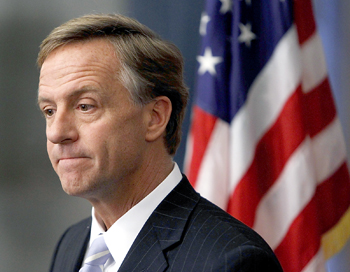NASHVILLE -- Gov. Bill Haslam says he didn't know his freeze on new state regulations delayed a proposed environmental rule affecting his family's convenience stores and truck stops.
The would-be rule directs businesses and local governments to replace single-walled underground fuel storage tanks installed before July 2007 with double-walled tanks if they are used to dispense fuel blends with more than 10 percent ethanol.
Haslam announced the 45-day freeze on new regulations four days after taking office Jan. 15, part of his promised "top to bottom review" of state government. The freeze affects dozens of proposed rules.
"In our commitment to transparency, it is critical that we weigh the benefits of a rule or regulation to consumers along with the cost of impacting jobs," Haslam said when announcing the freeze.
Speaking later to the Chattanooga Times Free Press, Haslam said the freeze was not implemented with his family's Pilot Corp. in mind. The privately held company, in which Haslam holds an unspecified share, owns Pilot convenience stores and is the majority stakeholder in Pilot Flying J truck stops.
"When we put that [freeze] in place I couldn't have told you one rule that was in the pipeline," Haslam said in a recent interview. "Since that time I've learned about two or three. You telling me that [about underground tanks] is honestly the first time I've heard it."
He said he'd also heard about another rule that would increase environmental fees on businesses. The fees are supposed to cover the costs of regulation.
"I said, 'Well that's fair, [but] let's first make certain we're doing everything we can to control the costs of regulating before we raise the fee,'" Haslam said. "Now, we might have to do that. But my job first of all is to say, 'Are we holding our costs down before we raise that business' cost?'"
Officials last week didn't have a firm figure for the number of proposed rules affected.
The Department of Environment and Conservation's Division of Underground Storage Tanks proposed the tank regulation in November. A hearing was held Jan. 20.
TDEC staff cited a federal push to raise the percentage of ethanol in gasoline blends from 10 percent to 15 percent, called E15.
"There are currently no specific rules for the storage of E15 in Tennessee," agency spokeswoman Tisha Calabrese-Benton said in an e-mail.
She said the division has found that the higher ethanol content "can be corrosive to some systems" and could result in tank leaks. But the department believes the regulation freeze is appropriate, she said.
Opposing the tank-replacement rule are grocery and convenience stores, county highway officials, some equipment manufacturers and the Tennessee Farm Bureau.
They point out that E15 likely won't be legal for at least a year and suggest awaiting guidance from the U.S. Environmental Protection Agency and other groups.
Remarks by Calloway Oil Co. CEO Marty Calloway of Maryville, Tenn., in the record of the January hearing say the proposed rule could impose costs as high as $615 million if businesses and local government agencies are forced to replace single-walled tanks in one fell swoop.
Citing state figures, Calloway said 13,682 of the estimated 16,250 underground storage tanks in Tennessee are single-walled. Replacing them would cost about $45,000 each, he said.
Some critics cited impacts on "mom and pop" service stations and stores.
During his 2010 campaign, Haslam, a Republican, was repeatedly criticized by GOP primary foes and Democratic rival Mike McWherter over potential conflicts regarding Pilot in areas ranging from the environment to lottery tickets, which Pilot sells.
Dick Williams of Common Cause Tennessee, a public watchdog group, called the freeze's impact on Pilot "an example of things I'm sure are going to come up again."
"I don't necessarily draw the conclusion it's inappropriate, but I think it's a clear example ... that anyone with significant interests in his position are in a position to affect those interests whether that's their goal or not," Williams said.
John McFadden, executive director of the Tennessee Environmental Council, said leaking fuel tanks are a threat to groundwater.
"For anybody who's storing hazardous substances or chemicals in the ground, all it takes is for your groundwater in your well to get contaminated one time to understand the value of an underground tank," he said.
Haslam said in the interview he didn't think the rule affected Pilot a great deal because the company already has been double-walling its tanks. But the governor stressed he wasn't entirely certain that was the case.
On Friday, TDEC provided figures showing that at Pilot Flying J, 80 tanks are double-walled while 62 are single-walled.
At Pilot's convenience stores, 63 tanks are double-walled while 87 are single-walled, according to TDEC.
Pilot spokeswoman Cynthia Moxley said in response to e-mails that requiring double-walled tanks for blends with more than 10 percent ethanol "would discourage current providers and prospective providers from increasing the availability of this fuel product."
"It is important to note that the products containing a percentage of alcohol are actually less harmful to the environment in the event of a leakage than is gasoline. We do not feel this is necessary," Moxley said.
Contact Andy Sher at asher@timesfreepress.com or 615-255-0550.
